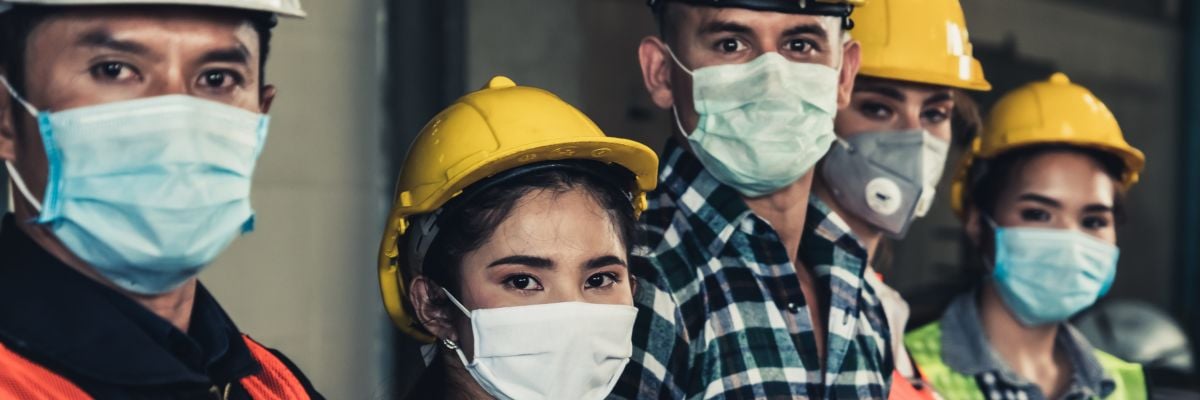
Earlier this week Texas judge Eric Moyé sentenced Shelley Luther to a week in jail for operating her salon in violation of Texas’s stay-at-home order. The judge gave Luther the opportunity to avoid jail time if she apologized for her “selfish” actions. Luther refused and said “I have to disagree with you, sir, when you say that I’m selfish. Because feeding my kids is not selfish.” Luther went on to say it wasn’t selfish for her employees to want to feed their own children and the salon was using social distancing standards that were comparable to those being employed in other businesses.
The Texas Supreme Court and the State’s governor have since moved to have Luther released, but the case raises an important issue when it comes to recent “lockdown” orders: how do we balance the right to life (in the sense of preventing unnecessary deaths) with another right that often goes unmentioned: the right to work.
Catholic philosopher Edward Feser notes that lockdowns don’t just risk unnecessary economic damage, they also risk committing gravely immoral acts by denying a person the right to make a living:
When such interference is not absolutely necessary it is a grave offense against social justice (and not merely against prudence), certainly as social justice is understood in the natural law tradition and in Catholic moral theology. Hence, governmental authorities must not treat permitting and forbidding such work as prima facie equally legitimate courses of action, either of which might be chosen depending on which one strikes them as having on balance the best consequences. Rather, the burden of proof is on them to show that there is no other way to prevent greater catastrophe than temporarily to suspend the right to work.
Pope Leo XIII defends the right to work as arising from the natural duty for a person to provide for himself and his family. For example, if I have a duty to speak the truth, then I have the right to speak.”
Likewise, if we have a duty to carry on lives that, unlike other animals, have stability and focus on pursuing the good, then “it must be within [man’s] right to possess things not merely for temporary and momentary use, as other living things do, but to have and to hold them in stable and permanent possession” (Rerum Novarum, 6). This is “all the stronger” for families because “it is a most sacred law of nature that a father should provide food and all necessaries for those whom he has begotten” (RN, 13).
Further, if parents have a duty to provide for their dependents, they must have a way to provide for them: “In no other way can a father effect this except by the ownership of productive property, which he can transmit to his children by inheritance”. (RN 13)
In our modern age, this would include the right to operate or work at a business and the right to retain a significant portion of one’s wages. Now, some people may say there is no “right to work” but only a right to basic necessities like food and shelter. If the State can provide these things through cash payments or government entitlements, then how has the State violated anyone’s rights?
Catholic socialist Jose Mena even says Catholic teaching requires such mandated entitlements: “Pope St. John XXIII teaches that the rights of man include the basic necessities of life—medical care, food and shelter, rest—independent of anyone’s ability to secure these through labor. Is this not socialism?”
No, it isn’t. Here is what John XXIII actually said:
Man has the right to live. He has the right to bodily integrity and to the means necessary for the proper development of life, particularly food, clothing, shelter, medical care, rest, and, finally, the necessary social services. In consequence, he has the right to be looked after in the event of ill health; disability stemming from his work; widowhood; old age; enforced unemployment; or whenever through no fault of his own he is deprived of the means of livelihood (Pacem in Terris 11, emphasis added).
The right to life includes the right to “make a living” and the State should help those who are incapable of making a living. But the State shouldn’t get credit for providing this assistance if it is doing so because it unjustifiably caused the evil of “enforced unemployment” in the first place. Just as the right to free speech doesn’t extend to the freedom to cause imminent danger (e.g. shouting fire falsely in a crowded theatre), the right to work isn’t absolute and can be suspended in similar cases of imminent danger. But just as the State must put forward substantial evidence to justify depriving someone of the right to raise his children, the State must do the same when depriving someone of the right to support his children through otherwise lawful employment.
The State can’t fall back on merely hypothetical “doomsday scenarios” to justify this serious infringement on human rights: it must provide clear evidence that this is the only way to avoid an exceptionally grave evil that will befall society if normal work continues.
Moreover, as Feser points out, a society in which people must be dependent on government is itself an evil that should be avoided except in extraordinary cases. This is the Catholic principle of subsidiarity, which is the belief that a higher authority should subside or “sit back” and intervene only when lower, local authorities cannot address a problem. Pope Pius XI formulated the principle, which he said “cannot be set aside or changed,” this way:
Just as it is gravely wrong to take from individuals what they can accomplish by their own initiative and industry and give it to the community, so also it is an injustice and at the same time a grave evil and disturbance of right order to assign to a greater and higher association what lesser and subordinate organizations can do (Quadragesimo Anno, 79).
Pope Leo XIII was adamant that it is not the state’s responsibility to provide for individuals or their families, except in cases of extreme need. “There is no need to bring in the state” because “man precedes the state, and possesses, prior to the formation of any state, the right of providing for the substance of his body.” Likewise, the duty of parents to provide for their children “can be neither abolished nor absorbed by the state,” and when socialists seek to usurp parents’ duty to provide for children, they “act against natural justice, and destroy the structure of the home” (RN 14).
Once again, the State commits a grave evil when it forces people to become dependent upon it without a good reason.
Now, it is not our purpose here to determine whether the spread of Covid-19 in a certain nation, state, or county represents such a reason at this time. That’s a decision for civil authorities to make based on solid evidence (and not merely hypothetical alarmism): they must prove that suspending the right-to-work is the only way to combat the grave evils associated with this pandemic.
But civil authorities should not treat work as a nuisance that people can now fortuitously avoid in light of this pandemic. Pope Leo XIII said we still would have worked even if humans never fell from grace, though our work would not be so toilsome (RN 17). John Paul II spoke of the “dignity of work” and said “work is a universal calling, it is familiar to everyone” in spite of all this toil— perhaps, in a sense, because of it—work is a good thing for man (Laborem Exercens 9).
As the Covid-19 pandemic unfolds, we pray civil authorities will follow Pope Leo XIII’s advice to “look upon the world as it really is” (RN 18) and consider laws that prohibit working, not as mere inconveniences to be ameliorated with cash payment programs, but a serious infringement of a basic human right that should only be temporarily used under the gravest circumstances.



